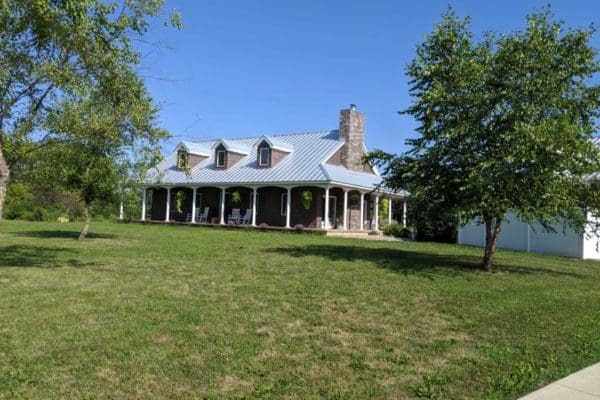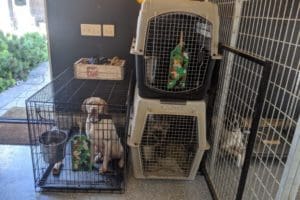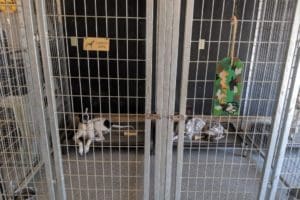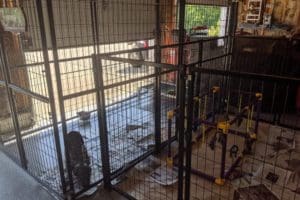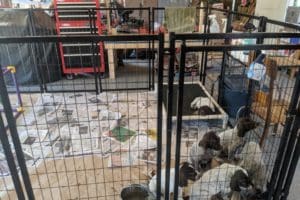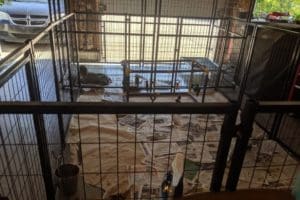Deerfield, Michigan – On country roads midway between Toledo, Ohio, and Ann Arbor, Michigan in the small village of Deerfield, Michigan, German Shorthaired Pointer (GSP) breeder Nancibeth Koutstaal makes a home with her two teenage daughters, husband Steve, nine adult GSP’s, and, of course, the puppies. The Canine Review visited Ms. Koustaal in late August 2019 and spoke with her about her breeding business, LegacyK.
The property consists of a single large residence, an unattached garage, a patch of lawn, and wild prairie. The River Raisin, which flows into Lake Erie, abuts the southern edge of the property and provides Ms. Koutstaal’s herd of active, athletic dogs with early-life and frequent exposure to water and swimming.
Koustaal says she got her start in the dog world with German Shepherds, helping to train K-9’s to assist police. But when her lifestyle changed and took on new priorities, the kind of dogs she bred changed, too.
“I was thinking about starting a family and wanted a breed of dogs that was going to be great with kids,” she told The Canine Review. “The German Shepherds that I worked with then were really high, dry dogs. Working dogs. Not necessarily super great family dogs. Plus, I was an avid hunter, so I wanted something with great temperament and was a great hunting dog. The German Shorthaired Pointer fit that bill,” she added.
Her dogs have ranged in quantity from just six up to 12 dogs, not including the number of puppies in her home at a given time.
Ms. Koutstaal says she has bred several dogs over the years who have taken winning titles. “Taylor” was the first of Ms. Koutstaal’s dogs to win a group placement in all breeder/owner/handler in the Canadian Championship. Later, she says, “Diva” was named the No. 1 female in Canada in 2008, and Canada’s No.1 GSP in 2009. Ms. Koustaal also spoke about “Vonna,” who earned “Best Puppy” in a group title in the Canadian Championship.
Other dogs bred by Ms. Koutstaal, but owned and trained by others, have gone on to be multi-best in show winners in Australia and, even runner-up bitches at the Westminster Kennel Club show.
Ms. Koutstaal says she is self-taught. “I didn’t have a mentor or anything like that. I started learning pedigrees and bloodlines and the right steps to take breeding dogs,” she added.
To keep the size of her pack manageable, Koustaal said that she tries to minimize the number of dogs who live in her home by placing some in foster homes, in addition to the nine adult dogs who live with her on the property. Ms. Koutstaal explained that she continues to use the foster dogs in her breeding program, but that once these dogs retire, the foster families get sole custody of the dogs.
There were 11 adult dogs on site when The Canine Review visited, including two English pointers Ms. Koutstaal was training, along with eight puppies who had not yet gone to new homes. All but one of the pups had been sold, and the remaining pup was unspoken for because the owner backed out, Ms. Koutstaal said.
Policies
Ms. Koutstaal says she requires all prospective buyers to fill out an application, to speak with her by phone or in person, and to answer a series of questions.
The first question she asks is, “Why German shorthaired pointers?” This question, she says, is intended to gauge the would-be owner’s knowledge of the breed as well as whether the person or persons are a good match for the breed’s high-energy level and activity needs.
“If someone is looking for a dog that is going to lay on your couch, definitely not the breed for you,” she says.
A promise to exercise the dog sufficiently is not Ms. Koutstaal’s only requirement. Ms. Koutstaal says she has rejected applicants who indicated a sole interest in her dogs for hunting, which, to her, suggested that the dogs would not live in homes with families, but, instead, in outdoor kennels, separated from household life.
Ms. Koutstaal does not oppose the idea of creating separate physical spaces for dogs, such as kennels, provided that each dog is also integrated into human household life. Indeed, Ms. Koutstaal’s adult dogs have crates in the unattached garage, which is heated in the winter and cooled in the summer. During The Canine Review’s 30-minute interview with Ms. Koustaal, all nine adult dogs (plus the two dogs who were boarding there to be trained) were crated in the garage. And, she says, the dogs often sleep inside her house.
How puppies are whelped and raised
All LegacyK puppies, she says, are born in her living room and raised in her home with help from her two teenage daughters and husband, Steve when he is home. “He’s very much a part of the dogs. He’s always had [German shorthairs], even prior to us being together, but they were just pets and hunting dogs. He does some of the field trials with me and is actively involved in hunting and helping train. He’s never been in the showroom, but he supports all of it,” she said of Steve.
Ms. Koutstaal says that she does not hire outside help to handle the dogs or puppies except for when she travels. (Large-scale, commercial breeders often employ several full-time kennel attendants; a breeder who does not employ multiple kennel attendants, let alone one, is an indicator that the breeder is not simply a figure head who has little or no role in day-to-day operations.)
By the numbers
This year, as of September 2019, Ms. Koustaal says she has bred a total of 21 puppies from three litters, which she says in on the high end, and done out of biological necessity:
“We have some older girls. They haven’t had puppies. We’ve been concentrating on showing and campaigning them. They are getting older and it was breed them now or never,” she says.
The average cost of a LegacyK puppy is $1,600, assuming the buyer signs a limited registration and non-breeding contract. “If someone is interested in getting involved in showing … or possibly breeding down the road we have further stipulations, or guidelines, to work closely with us so that we can help educate and guide them in the right direction.”
Health clearances and guarantees
Ms. Koutstaal says she provides several health clearances for her puppies, including hips, elbows, eyes and heart. Because of their size, like many larger breeds, German Shorthaired Pointers can develop joint issues. She says she warns owners not to over-exercise their dogs. She also recommends obedience classes early.
Ms. Koutstaal says that he
r puppies also all arrive at their new homes with their tails docked, dewclaws removed, an initial round of vaccinations; they are microchipped, and wormed four times by the time they are nine weeks old.

